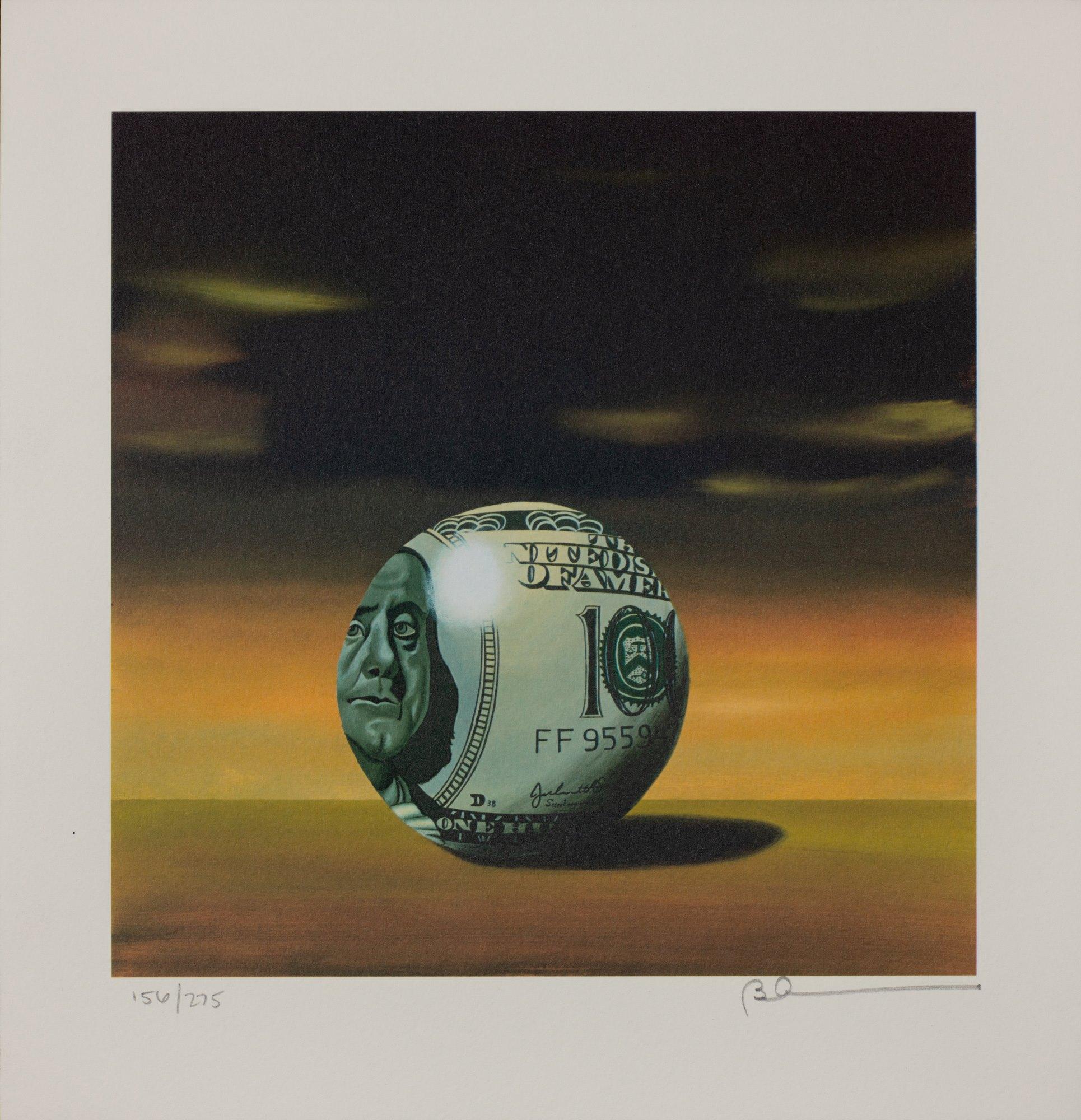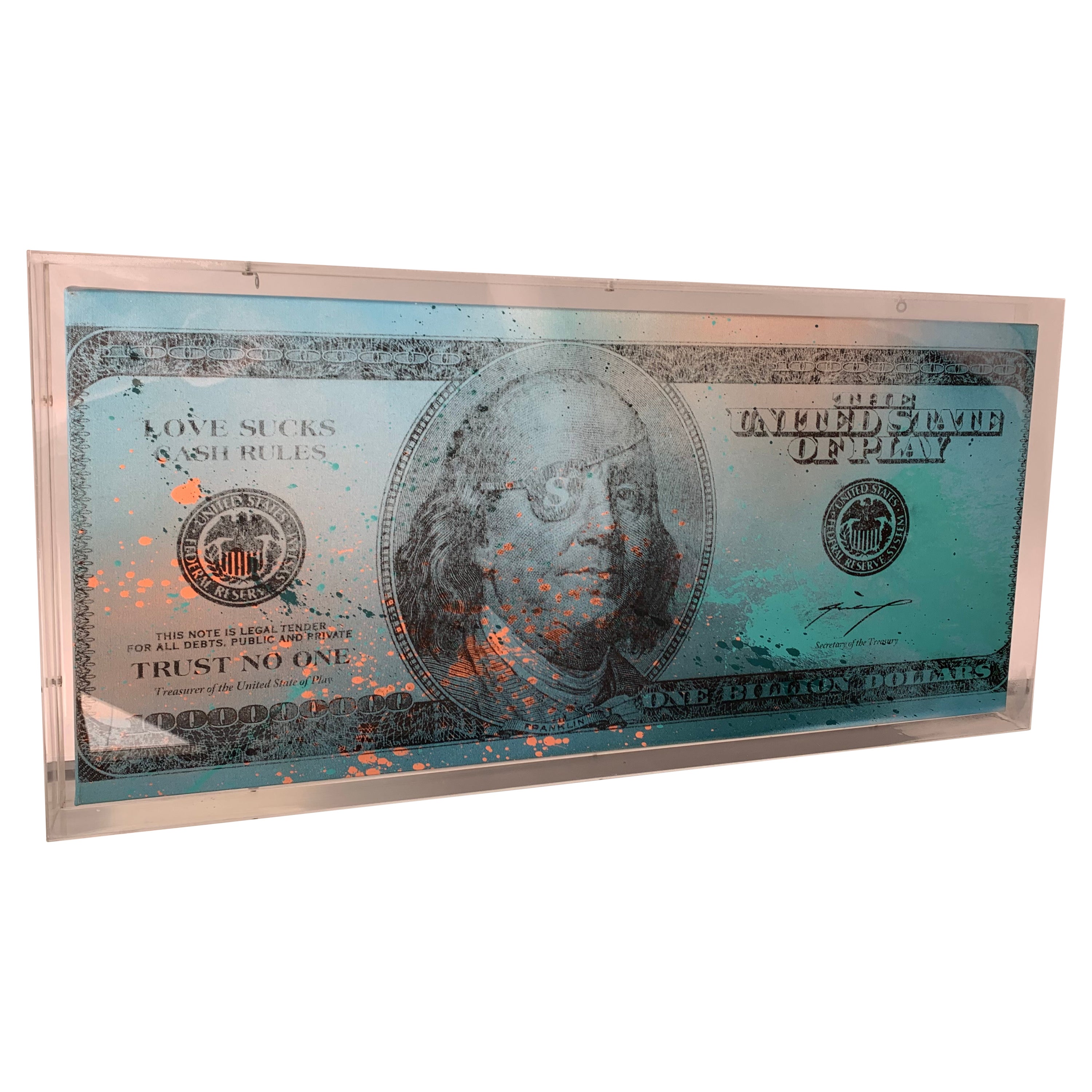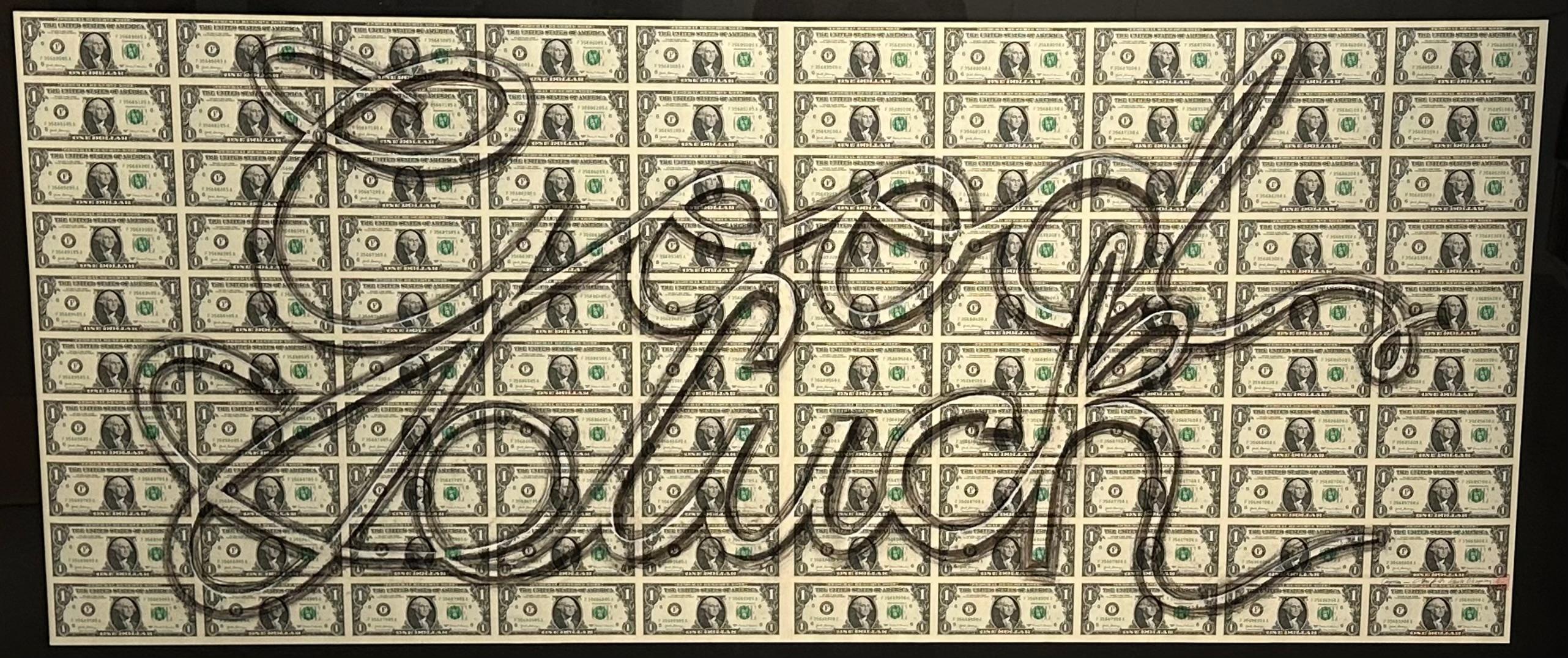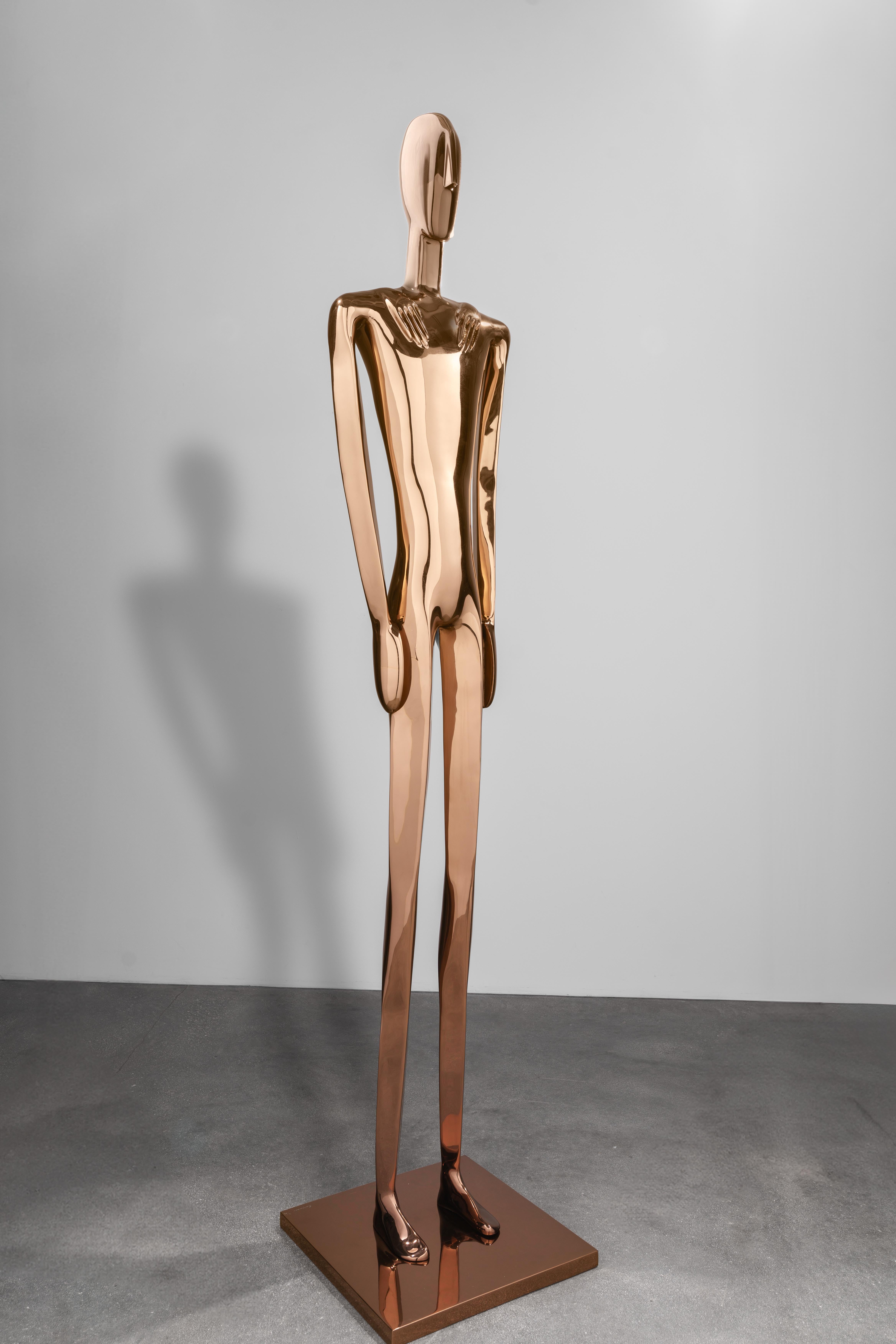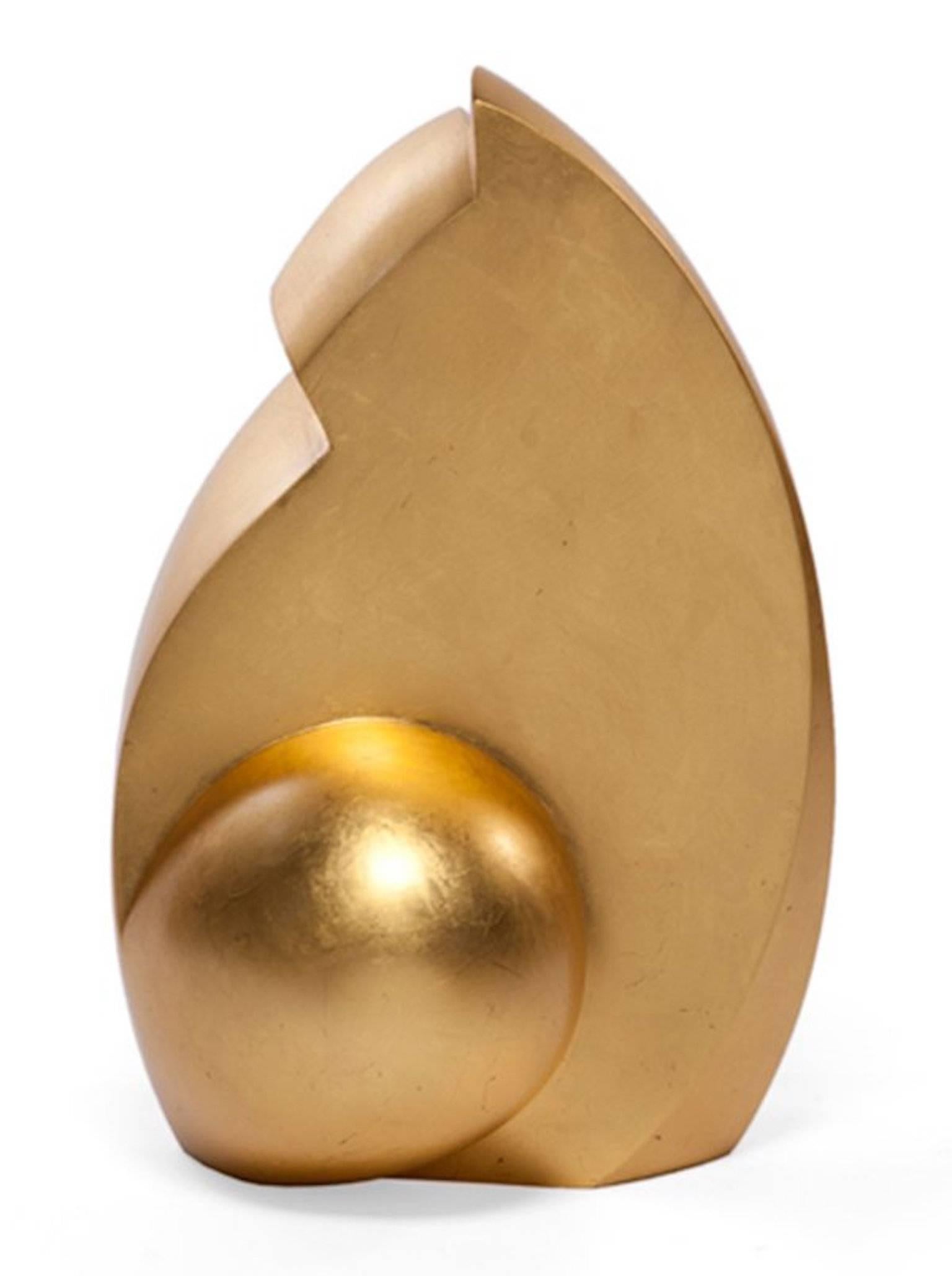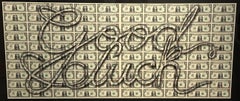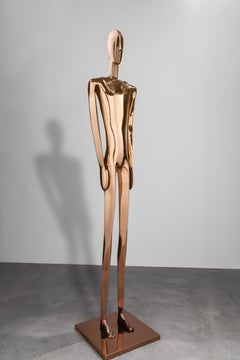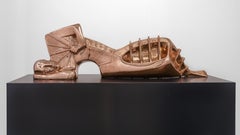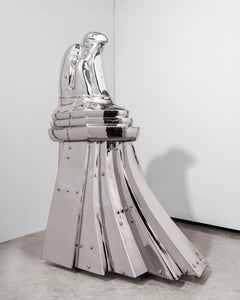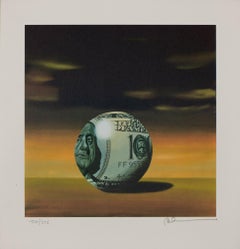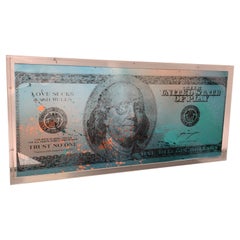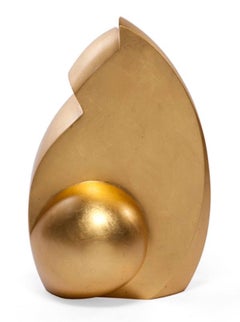Want more images or videos?
Request additional images or videos from the seller
1 of 3
Alberto Echegaray (Cayman)Moneyball (US Dollar)2014
2014
$120,000
£91,240.75
€105,110.63
CA$170,608.46
A$185,422.05
CHF 97,988.30
MX$2,243,206.56
NOK 1,220,374.51
SEK 1,152,719.63
DKK 784,769.80
About the Item
THE PROJECT
Searching for historical context, I conducted a research inside the Secret Archives of the Vatican, the Museo Real de Sevilla, the Real Casa de Potosi, the Temple of Freemasonry in Washington DC, the European Central Bank, the US Federal Reserve and the US National Archives supported by experts in history and symbolism from Cambridge, Oxford and Harvard University.
I choose the best materials available to make the art pieces, including blown glass from Murano, Italy, the most important global currencies and noble metals available in different corners of the planet, such as gold, silver, platinum and steel.
All inhabitants of our planet come into contact with the dollar. As the world’s best-known currency and symbol of economic stability, the dollar goes through the hands of beggars, workers, artists, children, students, elders, priests,
politicians and businessmen.
We work every day towards financial stability, and all of the world’s most impressive innovations have been achieved through the transfer of money. We created the value behind the dollar, and just as we created it, so can we destroy it.
MONEY AS ENERGY
The value we have given money is abstract, but contains an energetic force similar to kinetic and atomic energy, electricity, and heat.
In all forms of energy, balance is the key. Traditional Chinese medicine asserts that insufficient chi in the body results in discomfort, and in modern culture, we experience the inadequacy of money as a similar condition. Lack of financial power often becomes a source of stress, but in reality, we have the choice to manipulate money’s role in our lives.
Just as too much concentration of chi leads to an unhealthy body and spirit, infatuation with money and material wealth can destroy lives and families. Money is only energy. How you handle it is up to you, but the
key is to decide consciously.
THE SPHERE AS A SYMBOL OF THE INFINITE
A perfect sphere is a symbol of totality, uniformity, concurrency, and original perfection. It is eternal, and has no beginning and no end.
Alain of Lille once said, “God is an intelligible sphere, whose center is everywhere, and whose circumference is nowhere.”
In this sense, the circular shape of the sphere represents the eternal “now” in which we exist, and a concept of perfection that we chase through the accumulation of monetary wealth.
SYMBOLISM:
The concept of this work began to develop around 2010. The first time it was presented was in 2012. Between 2010 and 2012, the Federal Reserve approved the initial 2 million dollars to carry out the project. What the artwork contains is as follows: it consists of $100 bills. Each bill weighs 1 gram, adding up to a total of precisely 10 kilograms of $100 bills within the sphere. To achieve this, the volume of the sphere was measured, and the necessary materials were carefully selected. We opted for the best materials available, including Murano glass, manufactured in Italy through blowing. For this reason, the sphere has an imperfection at the top of the glass, while the rest of what you see is polished aluminum. At the base, we can appreciate a prophecy in Latin about the world made by Isaac Newton. He worked extensively with symbolism, and as we know, money all around the world is laden with symbolism. From the earliest coins used by the Greeks and Egyptians, through gold and silver coins, and mixed coins due to wars, even copper coins. In the case of the dollar, a fundamental symbol worldwide is the "S" with a vertical bar in the middle. The origin of this symbol is attributed to Hermes, the god of commerce, who held a caduceus in his hand. This same symbol is found mainly in the Catholic Church and represents the spirit nailed to the material world, thus giving it economic value. This symbol was also branded onto the slaves brought to America. We can find this history in the Dominicans, a specific church in Madrid, where this symbol is present throughout the church. It represents slavery and later became part of the symbol of commerce, as mentioned earlier. Later, it was incorporated into the first regional currency in Europe, known as the "thaler" in English. The term "dollar" directly comes from the word "thaler." This currency was the first to gain global recognition, and the same symbol can be found in the two columns of the "real de a ocho," which was the world's first global currency. It was minted in Bolivia and Mexico and was the only currency accepted by the Chinese in trade with the Philippines when the Philippines still belonged to Spain. Over time, the symbolism was transferred to the "real de a ocho" coins in the columns and the papyrus scrolls found on the columns of Charles V. This development led to the creation of the dollar bill and the emergence of banks. Basically, the symbolism associated with the Masons, the "Founding Fathers," most of whom were members of the Scottish Rite, was incorporated into coins and banknotes, including the Eye of Horus, the famous pyramid, and other intriguing inscriptions found on the dollars we know today. Then, in 1900, in the 20th century, the Federal Reserve was created, and money began to circulate in the form of plastic money. The first credit card, Diners Club, was created in New York in 1953, initiating a global revolution in plastic money. This artwork was created in 2012 when contactless credit card systems did not yet exist. These systems have become popular in recent years, and we can observe the interaction of plastic money with digital systems. Lastly, the artwork integrates the symbol of slavery, representing the spirit nailed to the material world through a microchip. Some governments are considering incorporating microchips into our bodies, connected to a system that allows us to manage our digital assets, either on a blockchain network or a centralized computer network, enabling us to use our money through our bodies.
- Creator:Alberto Echegaray (Cayman) (1970, Argentinian)
- Creation Year:2014
- Dimensions:Height: 17.75 in (45.09 cm)Width: 17.75 in (45.09 cm)Depth: 19.75 in (50.17 cm)
- Medium:
- Period:
- Condition:
- Gallery Location:Miami, FL
- Reference Number:1stDibs: LU2735214506032
About the Seller
No Reviews Yet
Vetted Professional Seller
Every seller passes strict standards for authenticity and reliability
Established in 2022
1stDibs seller since 2024
Typical response time: 1 to 2 days
- ShippingRetrieving quote...Shipping from: Miami, FL
- Return Policy
Authenticity Guarantee
In the unlikely event there’s an issue with an item’s authenticity, contact us within 1 year for a full refund. DetailsMoney-Back Guarantee
If your item is not as described, is damaged in transit, or does not arrive, contact us within 7 days for a full refund. Details24-Hour Cancellation
You have a 24-hour grace period in which to reconsider your purchase, with no questions asked.Vetted Professional Sellers
Our world-class sellers must adhere to strict standards for service and quality, maintaining the integrity of our listings.Price-Match Guarantee
If you find that a seller listed the same item for a lower price elsewhere, we’ll match it.Trusted Global Delivery
Our best-in-class carrier network provides specialized shipping options worldwide, including custom delivery.More From This Seller
View AllGood Luck
Located in Miami, FL
On top of uncut sheets of authentic US dollars from the Federal Reserve, Good luck is shown in a friendly font that is reminiscent of advertisements aimed at convincing viewers that ...
Category
2010s Paintings
Materials
Paper, Photographic Film, Pencil
Generational Human
Located in Miami, FL
A generation refers to all the people born and living at about the same time, regarded collectively. The sculpture is connected with systemic constellations, a method of addressing i...
Category
2010s Sculptures
Materials
Steel
Meditation man
Located in Miami, FL
Meditation has been a cornerstone of spiritual practices for centuries, offering numerous mental and physical health benefits. It involves training the mind to focus on a specific ob...
Category
2010s Abstract Sculptures
Materials
Steel
Eagle - Libertad
Located in Miami, FL
The eagle holds great significance for Egyptians, Greeks, and Romans as the bird of Jupiter, the King of Gods. It is also viewed as the symbol of strength, courage, and immortality. ...
Category
2010s Sculptures
Materials
Steel
PINOCCHIO (MONUMENTAL)
Located in Miami, FL
The metallic Pinocchio, which was chosen by the European Cultural Institute to participate in the Venice Biennale in 2019, uses the figure of the Italian puppet and the allegory of t...
Category
2010s Sculptures
Materials
Stainless Steel
Pinocchio
Located in Miami, FL
The metallic Pinocchio, which was chosen by the European Cultural Institute to participate in the Venice Biennale in 2019, uses the figure of the Italian puppet and the allegory of t...
Category
2010s Sculptures
Materials
Stainless Steel
You May Also Like
Money Ball
By Robert Deyber
Located in Greenwich, CT
Money Ball is a lithograph on paper, initialed lower right 'BD', 9 x 9" image size. From the edition of 395, numbered 156/275 (there were also 100 Roman and 20 AP), framed in a conte...
Category
21st Century and Contemporary Contemporary Prints and Multiples
Materials
Paper, Lithograph
Maximilian Wiedemann, Sculpture "Billion Dollar bill", 2015
Located in Saint ouen, FR
Maximilian Wiedemann - sculpture "Billion Dollar bill" - 2015
Canvas, frame and plexi glass
Measures: 108 x 52 x 7
Signed and numbered 3/10.
Category
2010s European Post-Modern Contemporary Art
Materials
Fiberglass
Palindrome
Located in Santa Fe, NM
Diptych
Fused Glass created in a kiln.
method
Relatively simple materials. Beginning with float (recycled window) or plate glass, pieces are cut and arranged with hand-cut glass s...
Category
2010s Abstract Sculptures
Materials
Glass, Mica
Joel Urruty - Colomba, Sculpture
By Joel Urruty
Located in Greenwich, CT
"As an artist I strive to create elegant sculptures that capture the true essence of the subject matter. Form, line and surface are used as the visual language. The figure is abstrac...
Category
21st Century and Contemporary Contemporary Abstract Sculptures
Materials
Gold Leaf
100 Dollar Bill
By Robert Silvers
Located in Long Island City, NY
A photo collage by Robert Silvers from 2003. A mosaic made up of images and details of currencies from around the world composited together to form an American 100 dollar bill...
Category
21st Century and Contemporary Modern Color Photography
Materials
Photographic Paper
Price Upon Request
Joel Urruty - Sierra
By Joel Urruty
Located in Greenwich, CT
"As an artist I strive to create elegant sculptures that capture the true essence of the subject matter. Form, line and surface are used as the visual language. The figure is abstrac...
Category
21st Century and Contemporary Contemporary Abstract Sculptures
Materials
Gold Leaf
Price Upon Request
